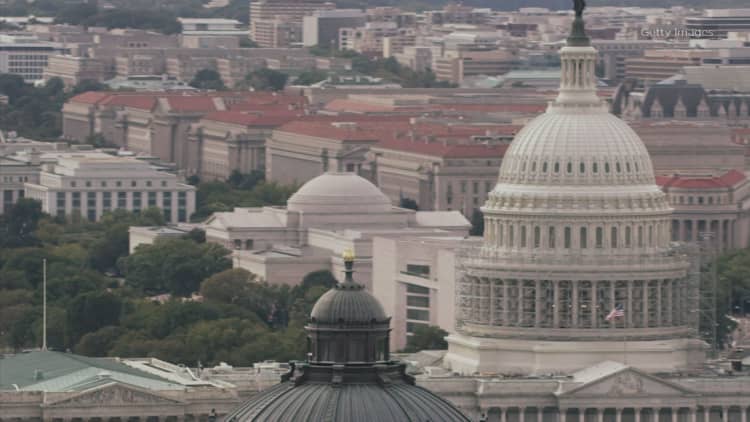
The White House on Monday released its first economic analysis of the Republican tax plan, an attempt to establish the intellectual underpinning for the argument that cutting corporate taxes ultimately helps middle-class workers.
The report from White House chief economist Kevin Hassett projects that the GOP goal of reducing the corporate tax rate from 35 to 20 percent will result in a windfall for workers. Hassett predicts average U.S. household income would jump at least $4,000 a year but could rise as much as $9,000 annually.
Those benefits, the analysis said, would start kicking in about four years after the tax plan was enacted and reach fruition after seven years. In a call with reporters, Hassett also suggested that the plan could deliver the 3 percent economic growth rate that President Donald Trump has long promised. But he cautioned that lawmakers would have to fill in the details before any analysis could be completed.
"I think there are a lot of policy levers that we can move to make it so that we are not at a new normal, below 3 percent," Hassett said. "And one of them ... is corporate tax policy."

Other economists and tax analysts have balked at those numbers, which Hassett previewed in a speech earlier this month. At issue is the connection between changes in corporate tax rates and worker wages. Most of the papers cited by the White House estimate that workers bear at least half of the burden of the corporate tax rate through reduced wages. That means cutting business taxes would result in more money in employees' pockets, the report argues.
But that connection is hotly contested, with the nonpartisan Tax Policy Center finding that only about 20 percent of the burden falls on workers. If that's the case, cutting corporate rates would have little effect on what workers get paid.
"Hassett made some bold promises to U.S. workers, but, based on what we know so far, the Unified Framework can't deliver them," Howard Gleckman, senior fellow at TPC, wrote in a blog post this month, referring to the Republican tax plan.
The proposal has come under heavy fire from Democrats — and even some Republicans — for appearing to benefit the wealthy most of all. During a speech in Washington on Friday, Treasury Secretary Steven Mnuchin acknowledged that repealing the estate tax "disproportionately helps rich people," despite Trump pitching the provision as a boon for farmers and truck drivers last week.
In addition, a recent NBC News/Wall Street Journal poll found 55 percent of Americans believed taxes on companies should go up — not down.
On Monday, Senate Minority Leader Chuck Schumer slammed the White House report as "fake math," pointing out that wage growth has remained anemic even though companies are posting record profits.
"This deliberate manipulation of numbers and facts could lead to messing up the good economy the president inherited from President Obama and hurting the middle class," he said. "Rather than helping the biggest corporations avoid paying their fair share, tax reform ought to reward those companies that create jobs and raise wages here at home."
Still, Hassett's findings are likely to provide the Trump administration and GOP leadership critical ammunition as they make the case for tax reform beyond the Beltway. Cutting corporate taxes allows companies to reinvest in their businesses, Hassett told reporters. Better tools allow workers to become more productive.
"When workers can produce more for a business, businesses can afford to pay their workers more, and wages go up," he said.
Hassett has previously argued that corporate profitability and wages are no longer tightly linked because many multinationals have shifted earnings overseas — and kept them there — to escape America's higher tax rate. The Republican proposal to establish a territorial corporate tax system, in which companies would no longer have to pay tax on foreign earnings, would help restore the relationship between U.S. firms' profits and wages, Hassett said.
In the report, Hassett estimates companies would have kept $140 billion more of their 2016 profits in the United States if the corporate rate had been 20 percent. The report projects that would have translated into a 1 percent raise for workers.
Hassett acknowledged that the effect of a territorial system coupled with companies bringing back overseas earnings was unclear. Previous academic research was conducted before profit-shifting was so pervasive, he said.
Still, Hassett was optimistic that the change would mean even more money for workers in the long run.
"Household income boosts from this channel may be additive to the estimated $4,000 in income," the report said.

